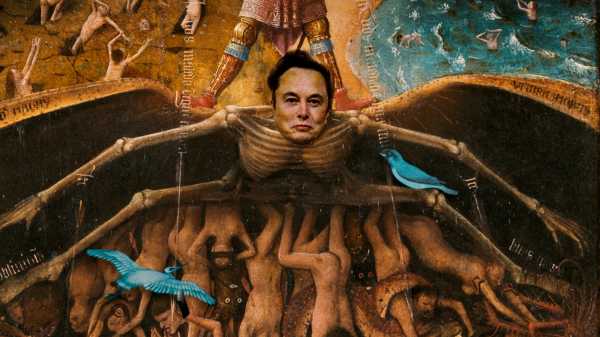
Late last Thursday, following many months of hesitations, attempted reneging, and last-ditch negotiations, Elon Musk closed a forty-four-billion-dollar deal on his acquisition of Twitter. He had been clear about his intention to overhaul the company, and he immediately delivered, firing the C.E.O., Parag Agrawal, and other top executives. He dismantled Twitter’s board and named himself the sole director, and reportedly plans to lay off a large proportion of the company’s employees. To lead the new era of the company, he has installed a cabal of Silicon Valley investors, entrepreneurs, and friends—whose strategy thus far has involved conducting public Twitter polls about which features the platform should add. The venture-capital investor Jason Calacanis, part of Musk’s so-called war room, identified himself as Twitter’s “chief meme officer” and posted a photo of a coffee cup resting on a Twitter-branded napkin as if to shout, “The cavalry is here!”
Musk has said that he acquired Twitter in part to safeguard its role as a “digital town square.” In an open letter designed to placate advertisers, who provide the vast majority of the company’s revenue, he declared his desire “to help humanity, whom I love.” But the success of the platform under his leadership will depend more on banal business decisions than on his professed moral mission. In its sixteen-year history, Twitter has only rarely been profitable. Over the past decade, its core features have barely changed, and its growth has been much slower than that of many competitors. Musk’s plan to shed a large proportion of Twitter’s staff means that the company will likely have to take a laxer approach to content moderation. In the name of free speech, he has hinted at his intention to bring back banned accounts such as Donald Trump’s. But Musk will have to strike a careful balance. “Twitter obviously cannot become a free-for-all hellscape,” he wrote in his letter to advertisers. The problem is that the platform already seems like one to many of its users, who habitually refer to it as the “hellsite.” On the one hand, it is difficult to imagine Twitter getting any worse, whatever changes Musk makes. On the other hand, a Twitter with an upgraded business model and a lower barrier to speech is a tough sell. Musk’s town square might be better maintained, but there will be more people shouting obscenities in it.
In recent days, the implications of Musk’s new approach have begun to come into view. Embattled Twitter staffers have been working around the clock to fulfill haphazard assignments; some have apparently taken to sleeping in the office. According to reporting from the newsletter “Platformer,” engineers were asked to prove their worth by printing out their recent code for Musk and others to evaluate—then were told to shred it instead. Musk has announced the development of a “content-moderation council,” similar to Facebook’s Oversight Board; an attempt to revive Twitter’s influential short-form-video platform, Vine; and a plan to charge users for blue-check verified status. (The fee was quickly downgraded from twenty to eight dollars, owing in part to a tweeted complaint from Stephen King.) The barrage of updates is emblematic of Silicon Valley’s favored “fail fast, fail often” ethos, but it’s unclear which tweeted plans will stick, and for many people the sense of volatility is a turnoff. Researchers found that there was a “measurable spike” in hate speech following Musk’s takeover, with certain racial epithets appearing at more than four times their frequency in the preceding week.
Before he bought Twitter, Musk complained that the platform’s most influential users were underactive. “Most of these ‘top’ accounts tweet rarely,” he posted in April, adding, “Is Twitter dying?” But now some are deciding to leave entirely. The television showrunner Shonda Rhimes, who has nearly two million followers, tweeted last weekend, “Not hanging around for whatever Elon has planned. Bye.” Alternative platforms, such as the open-source Mastodon, are seeing a jump in interest. But leaving Twitter because of Musk alone seems almost beside the point, because the platform’s problems were already there long before he owned it. Musk’s own account is emblematic of some of what ails Twitter—for instance, the way its most powerful users can mobilize armies of followers to harass targets or promote misinformation. On Sunday, as if to thumb his nose at the idea of content moderation, Musk shared (and later deleted) a tweet promoting a conspiracy theory about the assault of Nancy Pelosi’s husband.
Twitter occupies an uneasy place in the social-media landscape. To its advantage, it remains the newsiest of social networks, with a high concentration of journalists, owing to features such as enforced brevity and the option to organize one’s feed chronologically. Facebook, Instagram, and TikTok, by contrast, have moved toward algorithmically curated entertainment in the form of videos, leaving Twitter unchallenged as a source of real-time information. But newer apps such as Discord enable users to create private digital communities, providing an escape from the punitive publicness of Twitter’s time line. Moreover, Twitter doesn’t fit within the subset of platforms (including Patreon, Substack, YouTube, and Twitch) that help fuel the “creator economy” by offering their most popular users ways to monetize their followings through subscriptions or ads. Musk has suggested that Twitter may “reward content creators” in the future. In the meantime, the platform most often acts as the top of a marketing funnel, allowing users to make money by driving fans to their content in more profitable spaces.
Musk is reportedly considering other new features, such as paywalled D.M.s and promoted replies, to allow some users to boost their visibility. But many feel that they have a right to access the platform for free given that they create the content that drives its revenue. Musk has described the current version of Twitter as a “lords & peasants system,” where verification is available only to a select few according to their perceived level of importance. But his vision, in which the same status is paid for, would introduce a different kind of hierarchy. Average nonpaying participants, who would represent the bulk of the platform’s user base, would be left in the melee. The possibility of a more chaotic platform under Musk is already becoming a source of concern for advertisers. IPG Mediabrands, a major marketing firm, has reportedly recommended that its clients pause their paid Twitter advertising. In order for Musk’s Twitter to thrive—let alone survive the enormous debt that it took on to fund his takeover—the company will have to evolve into an entity with entirely new revenue streams. At least one prominent voice is optimistic: Jack Dorsey, the co-founder and former C.E.O. of Twitter, reportedly rolled over his roughly billion-dollar stake in the company into Musk’s new iteration.
On Monday, Calacanis, the investor who is part of Musk’s war room, tweeted that he’d been hearing ideas from marketing contacts about how to “increase joy” on the platform. The statement struck many Twitter users as especially oblivious. Since when has joy been the primary experience or even the aim of using Twitter, the Internet’s premier fight club? The platform thrives on vendettas and Schadenfreude. Its driving emotion is shame, as John Herrman recently wrote in New York magazine. One of Twitter users’ principal subjects of concern has always been Twitter itself, whether they’re complaining about a prevalence of toxic opinions or an overabundance of tweet threads. With Musk’s regime adding a new source of daily drama, the obsessive navel-gazing seems unlikely to abate. Twitter will still be the “hellsite” that users love to hate. They’ll continue to spar among themselves and generate engagement in the process. Earlier this week, Alexandria Ocasio-Cortez got into a Twitter spat with Musk over his blue-check subscription plan. Soon afterward, she reported that her account had been “conveniently” disrupted. “Doesn’t seem very free speechy to me,” she added, in a tweet that has been liked nearly a quarter million times. ♦
Sourse: newyorker.com






